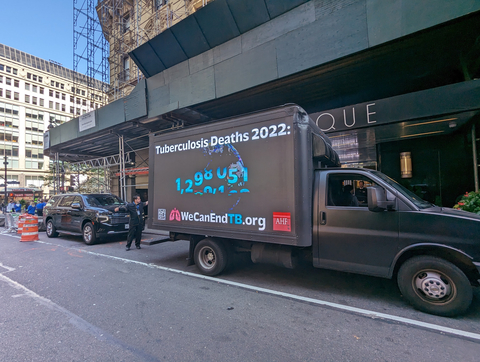The weeklong 78th U.N. General Assembly concluded today in New York City with the adoption of declarations on pandemic prevention, preparedness, and response (PPPR), tuberculosis (TB), and universal health coverage (UHC). An AIDS Healthcare Foundation (AHF) delegation attended all three U.N. panel sessions and expressed disappointment that world leaders did not make concrete commitments on PPPR but had tempered optimism that the ambitious commitments outlined in the tuberculosis declaration would be met after the world fell short on the 2018 TB declaration.
This press release features multimedia. View the full release here: https://www.businesswire.com/news/home/20230922430411/en/

A mobile billboard in Manhattan with advocacy messages about tuberculosis. The AIDS Healthcare Foundation created a video comparing the number of annual TB deaths in 2022 to the population of Manhattan - both are approximately 1.6 million. The video was displayed on a mobile billboard that drove all week in close proximity to the U.N. building to catch the attention of U.N. General Assembly delegates. Photo credit: Denys Nazarov (Photo: Business Wire)
Tuberculosis, the world’s deadliest infectious disease, kills an estimated 1.6 million people annually and is the leading cause of death for people living with HIV. While the U.N. declaration includes strong language on ending TB by 2030, all global leaders must ensure it translates to action to protect people from a disease that’s preventable, treatable, and curable.
“The U.N. declaration on tuberculosis is promising as it outlines commitments that the TB community has advocated for, including committing $5 billion annually to the TB response, universal access to TB treatment and services, incorporating civil society in TB strategies, and integrating TB services with primary and HIV healthcare settings,” said Guillermina Alaniz, Director of Global Advocacy and Policy at AHF. “That said, world leaders must make tangible steps in their countries to implement these lifesaving commitments – we must end tuberculosis as millions of lives hang in the balance.”
The COVID-19 pandemic showed the world all the proof needed of what happens when an unprepared and uncoordinated global public health system is hit with a deadly infectious disease outbreak. Still, with the U.N. declaration on PPPR, heads of state choose to not take decisive action to ensure the past is not repeated in future pandemics.
“The U.N.’s pandemic declaration does not do nearly enough to create a more transparent, accountable, and cooperative pandemic agreement that can protect all countries from future outbreaks,” said AHF Chief of Global Advocacy and Policy Terri Ford. “Asking for countries to ‘mobilize domestic public resources as the main source of financing’ for PPPR is unacceptable – the Pandemic Fund was established for a reason, and we urge wealthy nations to ensure it has the $10 billion it needs immediately.”
“We also call on decisionmakers to make stronger commitments on equity for vaccines and medical commodities and local vaccine production in Global South regions and countries. We also urge countries to agree on a minimum standard for pandemic preparedness capacity – which wealthy countries should help lower-income countries meet financially,” added Ford.
In response to the U.N.’s declaration on universal health coverage, as a global public health institution and the world’s largest AIDS organization worldwide – AHF believes everyone globally should have access to adequate and affordable healthcare; however, UHC must not come at the cost of other programs and responses struggling to survive amid resource scarcity.
“While universal health coverage is an admirable goal to strive for, existing responses must be fully funded before global efforts shift to it – namely, The Global Fund, The Pandemic Fund, and the global TB response,” added Denys Nazarov, Director of Global Policy and Communications at AHF. “Additionally, we cannot allow the Global North to define UHC for the Global South, and stakeholders and implementers must be involved at all levels of planning and implementation. Global health must not be viewed as a charity – it has to be funded in a spirit of partnership and mutual support.”
About AIDS Healthcare Foundation (AHF)
AIDS Healthcare Foundation, the largest global AIDS organization, currently provides medical care and/or services to over 1.8 million people in 45 countries worldwide in the US, Africa, Latin America/Caribbean, the Asia/Pacific Region and Europe. To learn more about AHF, please visit our website: www.aidshealth.org, find us on Facebook: www.facebook.com/aidshealth and follow us on Twitter: @aidshealthcare and Instagram: @aidshealthcare.
View source version on businesswire.com: https://www.businesswire.com/news/home/20230922430411/en/
Contacts
US MEDIA CONTACT:
Ged Kenslea, Senior Director, Communications, AHF
+1 323 308 1833 work +1.323.791.5526 mobile
gedk@aidshealth.org
Denys Nazarov, Director of Global Policy & Communications, AHF
+1 323.308.1829
denys.nazarov@aidshealth.org




